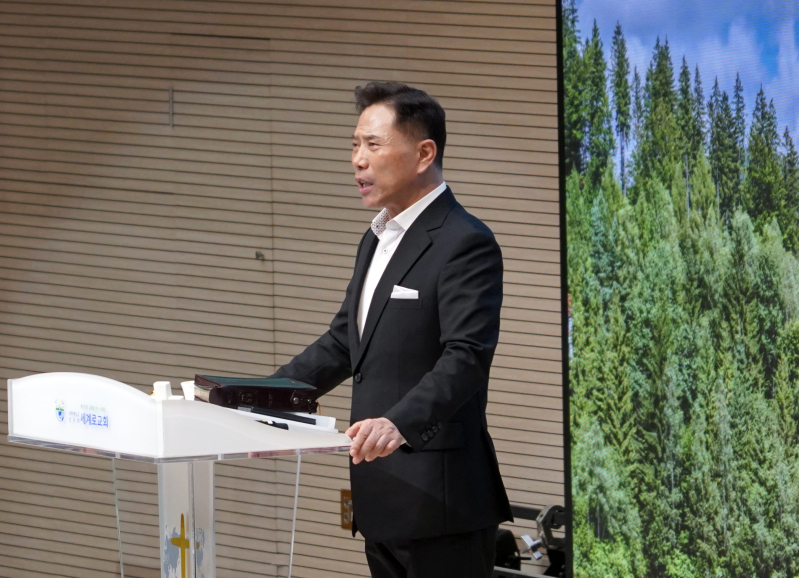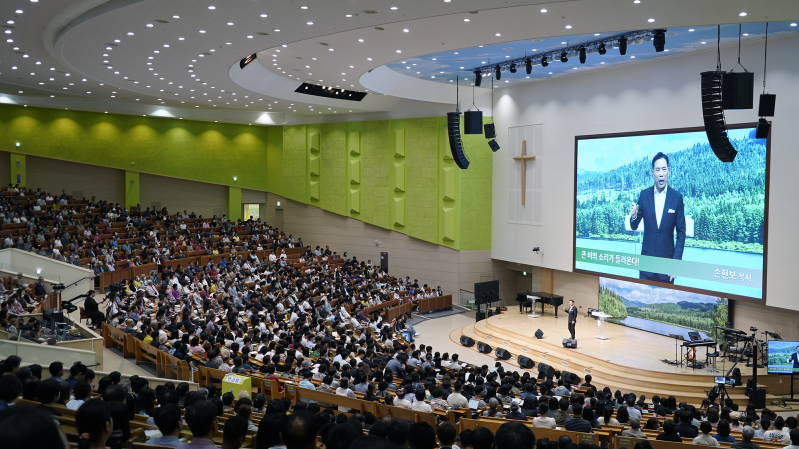
On Reformation Sunday, October 27, two million evangelical Christians in Korea are expected to unite for prayer and worship as they take a stand against a law that they fear will ultimately lead to the legalization of gay marriage and take the nation down the same path as liberal Western countries where parents cannot protect their children from gender ideology and Christians can no longer freely live out their faith. Christian Daily International recently had an opportunity to sit down with Rev. Hyun-bo Son, Senior Pastor of Segero Church in Busan, Korea, and chair of the organizing committee for event.
He speaks about how his church provides space for young people to be active participants in church life, what the legal context is for Sunday’s protest, why he believes church and state cannot be separated, and what he hopes the event will accomplish.
A church marked by evangelism and being a good neighbor
Rev. Son pastors a church in Busan, a large port city on the southern coast of Korea and the second most populous city in the country. He was born and raised in this region, he says. After grad school, he came directly to this church. At the time, however, it was a very small church with a little over 20 people, so he said, “let's evangelize” and within three months it became 100 members.
Nowadays, there are about 3,000 people worshipping each Sunday. Rev. Son only counts those people as members of the church who attend service. He says that every year, they baptize between 700 to 1,000 people. But due to the rural location of the church, many of them eventually go to local churches that are closer to their homes, while some young people and families also move to Seoul for study or work.
The impact and growth of the church “is all because of evangelizing really hard,” he says. They not only focus on evangelism, however, but also on addressing the needs of people in the region. Every year, they provide free cataract surgery for a thousand people, he says. And the church also gives out free rice to anyone who doesn’t have the means to provide for themselves. The motto of the church is to be a good neighbor.
‘If the young people want it, the church will do whatever it can to provide for what they need’
Asked how his church attracts younger people at a time when many Korean churches are struggling to reach the next generation, he says that if the essence of the gospel is shared, then people’s lives are being transformed whether young or old. But he also highlights that “the next important thing is to actually care about the young generation” and “to provide things and places where they can think and actively do things.”
Segero church seeks to provide young people opportunities to be engaged. “There is no special way to do that,” Rev. Son says, but adds that their service brings everyone together.

“It's not common in Korea that the church has service like us. The young kids and old people are all in the same sanctuary, worshiping God together. From eight to eighty, we come together as one. We pray together, we praise God together,” he says.
The Korean tradition is that young children go to their kids service and youth go to their youth service, Rev. Son explains but cautions that “then what happens is that they don't know what the church is up to. But we share everything with the young kids and the old people, so they all know what's going on.”
During Covid, the church continued to hold worship services. “The government came down hard on us, but we still worshipped,” Rev. Son recalls, adding that “the young kids, they fasted during that time and because of them, the adults were inspired, and they also fasted with them. The young kids are actually invested in the future of Korea. They want to know what's going on. They want to know how they can help, and they pray for it as well.”
Another example he gives is that the previous night, a group of some 20 young adults from his church gathered and made a song for the upcoming event on October 27. “It wasn't because anyone asked them, but they came together and they wrote the lyrics, they composed a song and they're doing this all together.”
The church is eager to provide the youth with opportunities to learn and understand today’s issues, so they can be informed. “On Saturdays we have a special time for the youth. We invite well-known scholars from around Korea who deliver speeches about international politics, social problems, environmental problems, and so on. They deliver these speeches to the kids and then the kids, they sit and they talk about this together. They have discussions about it,” Rev. Son says.
The church’s attitude is quite simply, “If the young people want it, if the youth wants it, then the church will do whatever it can to provide for what they need.”
Rev. Son laments that modern day Koreans are suffering an ideological crisis that emerged because of the increase of their income. Korea has seen a remarkable development from being a country of extreme poverty after the war in the mid-20th century to a global economic power today. Society has changed significantly as a result with the younger generation growing up with much more wealth than their parents or grandparents.
“They're worried about how to make more money. The big focus of Koreans is how to get to a higher position to have more power and to have more money,” he says. “There are a lot of people in Korea who believe that you'll only be happy if you have money.”
A lot of people now disregard the important values that the older generation held, and they started to disbelieve in the Bible, Rev. Son says. “So, we believe that instilling the correct biblical values in students is the most important thing right now.”
‘Most people do not know what the law is calling for’
Rev. Son also sees the influence from the West as something that contributes to the erosion of Christian values in Korea. Asked about the upcoming event on October 27, Rev. Son explains that “Korea is one of the very few nations that did not legalize gay marriage within the OECD countries.”
“We do not hate homosexuals. We are not trying to tell them what to do and what not to do,” he emphasizes. “But if these laws regarding gay marriage get passed in Korea, then the Christian Church cannot stand up for what they believe in, and they cannot say the things that they want to say.”
He points to Canada and other countries where stories are coming out of minors being led to believe they are transgender and undergoing medical procedures with parents not allowed to be involved in the conversation. “Sometimes it's the case that a 13-year-old will want to change their sex, but the parents cannot say anything about it. The students will get the hormone shots through the school and the parents will not be involved in the process,” he says, adding that Korean churches are opposed to excluding the parents from their children’s lives and education.
Rev. Son also laments how minors are young and naïve and can easily be misled about the risks and lifelong consequences of such treatments. He specifically points to a case “where a 13-year-old went through a sex change with the transition, and she thought that her breast would grow back.”
It is the prospect of facing such a future that led him to mobilize the Korean churches to oppose a recent change in the laws related to gay couples in order to prevent the country from going down this path.
Asked to elaborate on the current legal developments, Rev. Son explains that “July 18th was a big day in Korea's courts because they accepted that a gay couple can have health insurance benefits. From an international standpoint, after such a law is passed or after such an acceptance is seen in the courts, it usually took about two years or so until gay marriage was legalized.”
Historically, Korea did not have a lot of interest in homosexuality and the Confucianist culture meant that Koreans would be against homosexuality for a long period of time. “Even now more than 70% of Koreans are against gay marriage or homosexual activities,” he says.
A lot of the people wonder why anyone should say anything about what other people do, Rev. Son acknowledges. “However, the problem that Christians have with the issue is that if such laws are passed, then the Christian ecosystem will fail. It will become very difficult to live according to biblical values.”
He also believes it is a chance for the Christian Church to raise awareness among the wider society about the harm that the passing of these laws will bring to Korea. He is convinced that more than 90% of the people would be against young children at age nine or ten getting hormones for a gender transition. But a major issue is that “regular people do not know the depths of what the law is calling for.”
Therefore, they decided that all the Korean churches should unite and stand up against the passing of the law by holding a joint event where they plan to bring together two million believers – one million onsite in Seoul and one million online – to convey their perspective to politicians and lawmakers.
“All Korean churches are coming together on one day and they will be worshiping God together. There will be one service,” Rev. Son says, emphasizing that it is “unheard of in Korea” that “all of the Korean denominations have agreed to come together on October 27th.”
Aside from the public awareness effort, the event also aims to raise funds to address social needs, including for non-Christian organizations. “We plan to raise KRW10,000 (~US$7.25) from each of the 2 million participants. Some of it will go to drug abuse rehab, to prevent drug addiction, to single moms, and so on,” he says, commenting that half the amount had already been raised by the beginning of the month.
And Rev. Son hopes the event will provide “a good chance for churches to come together, pray together and have discussions together about how to help homosexuals”, including those in the churches who struggle with same-sex attraction. He acknowledges that there is also a small percentage of people who are born intersex, pointing to the example of the boxers at the recent Olympics in Paris.
Church and state cannot be separated because the church is under the law of the state
Asked how he would respond to Western churches, especially those in Europe, who believe in the separation of church and state and who would argue that the church should not get involved in such political issues like recognition of gay marriage by the state, Rev. Son poses a counter question: “If the Apostle Paul or Martin Luther or John Calvin saw what the Korean church is trying to do right now, would they applaud or would they say don't do that?”
“Politics and religion cannot be separated,” he argues, and points to the difference between North and South Korea.
“You've seen [satellite] pictures of North Korea. There are no lights [at night]. South Korea is bright. What is the difference between the two nations?” he asks. “There are no churches in North Korea and in South Korea, there's a church at every block.”
He continues by stating that the difference comes from the political system and that “the Church is part of the political system that governs the nation. You can't say this part of it belongs to the church and that part of it belongs to the politicians. When politicians make a law, churches are under the law, so they're affected by the law.”
Speaking to the situation in Europe, he says that it has been just over 500 years since the Reformation, but “what Luther fought for – ‘only by faith, only by the Bible’ – is non-existent now because people say that salvation is everywhere, they don't need Jesus anymore, so they don't have to come to church anymore.”
He acknowledges that “there were many things that happened that should not have happened during the thousand years of the Catholic church.” However, he says the Korean Church does not agree with liberal European churches “that kind of just go with what the society is doing.”
And although it looks like there has been a general acceptance of homosexuality among some of these churches, Rev. Son believes that God will overturn it. “That's because I believe that God reigns over this world. It looks like there's a strong stream flowing out from the direction of homosexuality and those legal changes, but I believe that there could be events that God will put in place that will change the flow.”
He adds that “if homosexuals have their rights, then also people who are against that idea also have a right to express their views.”
‘If there is no power in the Bible, what will we believe in?’
Rev. Son also points to the recent Lausanne Congress on World Evangelization that took place in Incheon, Korea at the end of September. He believes that it was the influence of Western churches that led to the Seoul Statement’s initial ambiguity on the question of homosexuality, and that it was the Korean churches who helped clarify the issue.
“I believe that what we're trying to do within Korea will block some of the wave that's coming from the western world. The Seoul Statement was very ambiguous. In some place, it said homosexuality is a sin but then it also said they can empathize with it.” The Lausanne movement was going in that direction, he says, but adds that “maybe being in Korea put a little stall on what they have been doing wrong.”
Bringing together a million Christians and worshipping God together will help slow down or even halt the “Western wave”, Rev. Son says. “Even if that law passes, we will continue to believe in the Bible and follow the Bible.”
He is concerned, however, about the trends he has seen in the West, especially in strongly liberal-leaning countries like Canada, and what the law change could bring about.
People may question why the church focuses on the issue of homosexuality so much, he says, “but the fact is that homosexuality has a different side to it. It's one law, but the society will be affected tremendously. If that one law about gay marriage is passed, then there are so many laws that follow with that flow.”
He gave examples such as Christians suddenly not being allowed to call God “Father”, likely in reference to a 2023 directive by the Canadian military that required chaplains to use more inclusive language out of respect for other religions.
“It will weaken the power of the Bible. If there's no power in the Bible, what will we believe in?” he asks, adding that “if that law is passed, then the ecosystem, the foundation that the church can stand on will be destroyed. And the evidence of that is that nowadays in Europe, there are only one, two, or five percent of people going to churches.”
Uniting a divided church and sending a signal to the world
Asked what his hope is for the upcoming event, Rev. Son says that similar to other countries, there are challenges within the Church.
“The Korean Church is very divided. Even inside different denominations, there are separations because of their needs and their wants. I believe that this event will be a very good time for everyone to come together and unite.”
“And we believe that in the wider society, people will see that parents will not be able to be involved in their children's lives, their education and even when it comes to sex change, if these types of laws are passed. So, through this event, we can show the world that doesn't care so much about the laws that this is a very important law to fight against.”





